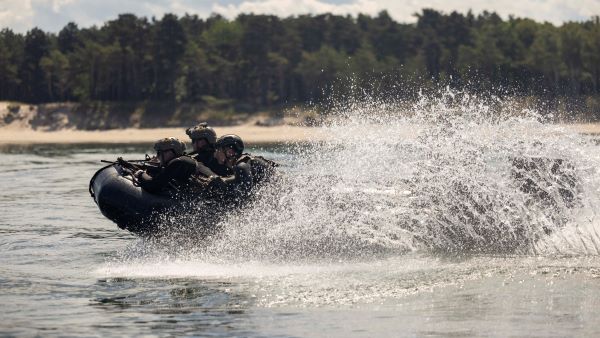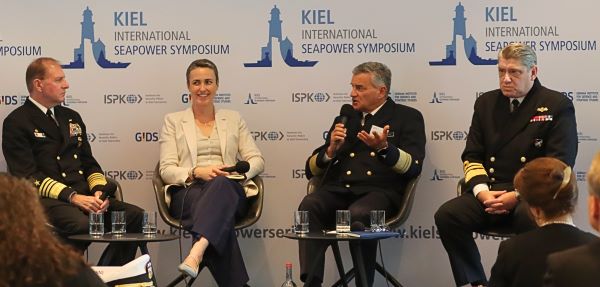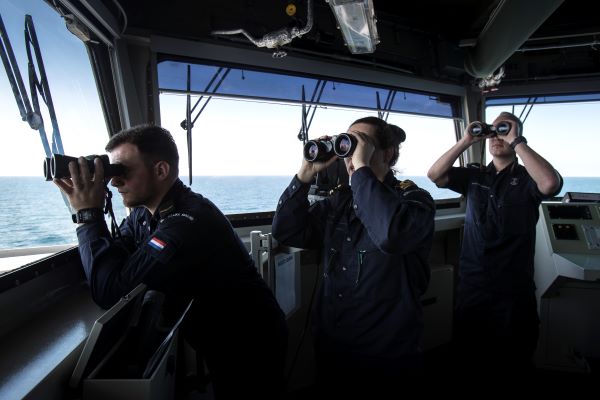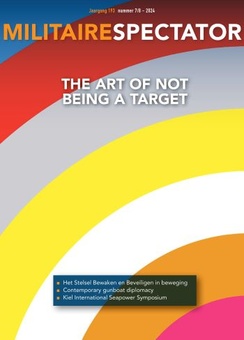With preparations for the major sailing event Kieler Woche in full swing, Kiel-based think tank ISPK hosted the annual Kiel International Seapower Symposium (KISS). Admirals, scholars and politicians gathered to discuss naval power under the general subject ‘(Re-)learning war – lessons from the Black Sea’.[1] The most important lesson? Don’t apply the lessons of war in the Black Sea one-on-one to other maritime hotspots. Individual circumstances simply diverge too much to create a generalized approach based on events in the Black Sea. Nevertheless, those events are worth studying.
Dr Sarah Kirchberger, ISPK’s Director, set the scene by pointing out the idea that the West’s rivals are ‘probing’ more and more: China and Iran, but also non-state actors like the Yemeni Houthis, increasingly test what they can get away with. All in all, those actors constitute an ‘Axis of disruption and upheaval’ and they learn and copy successful strategies from each other. Kirchberger warned that Western policymakers often wrongly perceive the nature of the players within the Axis of disruption, which leads to false assumptions about their intentions and obstacles in dealing with them.

U.S. Marines participate in NATO exercise BALTOPS 24. One of the most important lessons of the war in the Black Sea is that experience in that region cannot be applied one-on-one to other maritime hotspots, such as the Baltic Sea. Photo U.S. Marine Corps, John Allen
Different stakes in the Black Sea
An historian noted the different meanings of the Black Sea for Russia and Ukraine. In Russia’s case, the Black Sea provides a supporting element to its land war. With ship-based cruise missiles and the threat of an amphibious assault for example, more of Ukrainian territory can be put at risk. Thus, sea control essentially broadens Moscow’s options to wage war. For Ukraine, on the other hand, sea control is crucial for its survival. Kyiv depends on ports and free shipping routes to keep its economy going, the historian said.
After Russia annexed the Crimean peninsula in 2014 the naval balance of power shifted dramatically in Moscow’s favour, he continued. Ukraine lost about 75 per cent of its naval assets when Russia occupied the Black Sea naval base in Sevastopol. However, the Ukrainian navy could largely maintain its personnel and throughout the conflict, unlike the land war, casualties in that service branch remain low. Using creative tactics and adjustments Ukrainian forces managed to keep the (on paper) superior Russian Black Sea Fleet at bay and they could even contest sea control. For instance, Ukraine adapted ground-based missiles to serve as ‘21st century coastal artillery’, and with relatively cheap sea drones it could mount attacks against much bigger targets.

From left to right: Admiral Stuart Munsch (U.S. Navy), moderator Dr Alix Valenti, Vice Admiral Frank Lenski (German Navy) and Vice Admiral Mike Utley (Royal Navy) at the Kiel International Seapower Symposium 2024. Photo Bundeswehr, Lauw
Despite the odds, Kyiv forced the Russian Black Sea Fleet to switch into a more defensive posture, the speaker explained. This is not to say, another expert warned later at the symposium, that manned, capital ships become irrelevant: in other, wider theatres those ships are much less vulnerable to sea drones and they have their own capabilities that unmanned systems simply cannot provide. Small sea drones are nothing more than another tool in the box, a mix of high- and low-end assets remains necessary to achieve the best effects.
In terms of grand strategy, events in the Black Sea offer some insights. In a way, another speaker explained, the fighting in the Black Sea is the culmination of a clash between naval power (the US and its allies) and land power (Russia). For the latter, the Black Sea is not a maritime priority. This expert pointed at Moscow’s maritime strategy of 2022, a document that lists the High North as the number one naval priority, not the Black Sea. In addition, Russia’s geopolitical ‘turn to the East’ should be understood as an active strategy, and not as a reaction to sanctions imposed by the West. It is Moscow’s economic priority, starting well before the sanctions came into effect and unrelated to the security environment, to seek closer relations with a broadly defined East (including Africa). With regard to the aforementioned axis of disruption another speaker was more concerned by Vietnam’s (not unfriendly) reception of Russian President Vladimir Putin than the intensified, and more obvious, partnership with North Korea. ‘On which side will countries like Vietnam and South Africa end up?’
75 years of NATO: a quality on its own
Even though warfighting in the Black Sea does not offer a blueprint for future naval combat, NATO should still ‘wring all the learning out of this conflict that it can’, a speaker said. That comes with its own challenges, however, because NATO operators will miss years of training and experience in that specific region as a result of the ongoing conflict. The consequences of a lack of training and exercise in certain areas should not be underestimated.
Several speakers stressed that trust is the bedrock of the Atlantic Alliance, and (unsurprisingly at a sea power symposium), the navy is considered to be the service branch that can cooperate and build up trust the easiest: ‘The common threat of the sea brings navy personnel from different nations together’. Navies also serve as a diplomatic tool, with more subtle optics than other kinds of military visits. ‘A port visit looks friendly, paradropping a battalion of combat troops into another country’s territory probably does not’, a speaker quipped.
This year, NATO celebrates its 75 year anniversary, inviting reflection on and identifying future priorities for the Alliance. One speaker observed that 75 years of allies working together is a quality all by itself. After all those decades military cooperation has become instinctive. That also helps to accommodate the new NATO members, Finland and Sweden, although they obviously have been valuable partners of the alliance for a long time already. Still, those new members bring important skills and elements into the alliance. They both have a significant defence industry, a thorough whole-of-society approach, and sound experience at surviving on their own. Older allies and their navies should profit from those Nordic contributions to the alliance.

Dutch navy personnel participates in NATO SNMG2 in the Black Sea (2019). Without access to the Black Sea because of the war, NATO personnel will lack valuable training and experience in that region. Photo MCD, Gerben van Es
Many people compare the current security situation to the Cold War, but there is a significant difference: today’s simultaneous crises posit dilemmas, whereas during the Cold War NATO could focus on its core task of collective defence of allied territory. After all, you cannot be present everywhere all the time. Intervening in the Red Sea against the Houthi threat, for example, means that some assets are not available for other NATO tasks. One way of addressing this challenge, another speaker chipped in, is to better coordinate national and NATO operations. On any given day, he said, there are 40 major allied combat ships at sea. Taken together, in a more integrated approach, these ships can achieve operational effects that contribute to NATO’s overall strategic goals. It remains to be seen whether such ideas can be further developed in a time of diverging national interests and priorities within the alliance and growing doubts about the future political landscape of the United States.
[1] The entire symposium was subjected to the Chatham House Rule: quotes and observations are therefore not attributed to individuals or their affiliations. KISS24, hosted by the Institute for Security Policy Kiel University (ISPK), took place on 21 June in Kiel, Germany.
